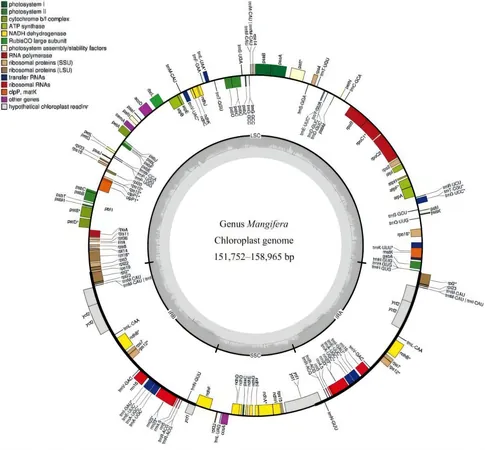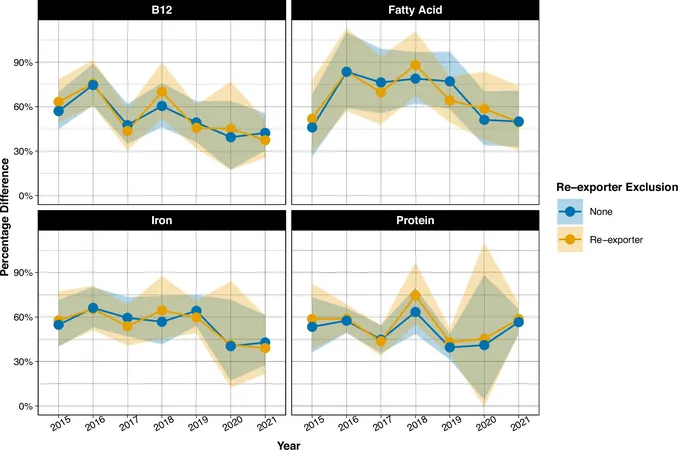
Groundbreaking Study Unravels the Complex Evolution of Mangoes: What This Means for the Future of the World's Favorite Fruit!
2024-11-01
Author: Wei
A revolutionary study has shed light on the intricate genetic tapestry of mangoes, unveiling extensive hybridization within the Mangifera genus. This research, encompassing whole chloroplast genomes and nuclear gene sequences from 14 species, offers unprecedented insights into the genetic diversity and hybrid origins of these beloved fruits.
Mango (Mangifera indica) reigns as the most cultivated species in the Mangifera family, boasting 69 species in the Anacardiaceae family. With India leading global production, followed closely by Indonesia, Mexico, China, and Pakistan, mangoes are a staple fruit enjoyed worldwide. Traditionally categorized by physical characteristics, new findings indicate that many species may share hybrid origins, reshaping our understanding of mango evolution and its rich genetic diversity.
Published in *Tropical Plants* on October 12, 2024, this study serves as a crucial resource for breeders aiming to identify and develop new mango cultivars with traits necessary to withstand environmental pressures such as climate change. The researchers employed cutting-edge Illumina sequencing techniques to analyze chloroplast genomes from 19 samples, resulting in an astounding range of raw reads from 55,999,560 to 181,601,786, with an impressive average read length of 150 base pairs.
Following rigorous data trimming to ensure accuracy, the analysis showed that each sample's data exceeded 20 times the genome size, making them perfect for chloroplast assembly. The results revealed chloroplast genome sizes spanning from 151,752 to 158,965 base pairs, maintaining a typical quadripartite structure with 115 genes, including 80 protein-coding genes, 31 tRNA, and 4 rRNA.
Interestingly, despite size variations across species, certain cultivars of M. indica and two samples of M. laurina exhibited identical chloroplast genomes, while two samples of M. odorata showcased minor structural differences due to deletions in non-coding regions.
The study's comparative analysis of nuclear gene phylogenies illustrated genetic clustering into distinct clades, highlighting close evolutionary relationships among species. Notably, wild species like M. lalijiwa and M. applanata show significant similarities to domesticated M. indica, pointing towards historical hybridization events that have influenced their evolution.
Dr. Robert J. Henry, senior researcher on the study, remarked, "Our research offers a detailed genetic framework that illustrates how hybridization has played a pivotal role in shaping the Mangifera genus. The intricate gene flow among species not only enhances our comprehension of mango evolution but also holds practical implications for breeding programs focused on improving fruit quality and resilience to stress."
This study represents the most exhaustive genetic exploration of Mangifera species to date, illuminating the hybridization processes crucial to mango evolution. The implications are immense; a deeper understanding of genetic relationships among mango species will empower breeders to develop more efficient strategies, ensuring the sustainability of this favorite fruit in an ever-changing climate.
Get ready for a future of mangoes that are not just delicious but also resilient, setting the stage for innovative agricultural breakthroughs! This groundbreaking research might just transform the way we cultivate and enjoy mangoes for generations to come.


 Brasil (PT)
Brasil (PT)
 Canada (EN)
Canada (EN)
 Chile (ES)
Chile (ES)
 Česko (CS)
Česko (CS)
 대한민국 (KO)
대한민국 (KO)
 España (ES)
España (ES)
 France (FR)
France (FR)
 Hong Kong (EN)
Hong Kong (EN)
 Italia (IT)
Italia (IT)
 日本 (JA)
日本 (JA)
 Magyarország (HU)
Magyarország (HU)
 Norge (NO)
Norge (NO)
 Polska (PL)
Polska (PL)
 Schweiz (DE)
Schweiz (DE)
 Singapore (EN)
Singapore (EN)
 Sverige (SV)
Sverige (SV)
 Suomi (FI)
Suomi (FI)
 Türkiye (TR)
Türkiye (TR)
 الإمارات العربية المتحدة (AR)
الإمارات العربية المتحدة (AR)